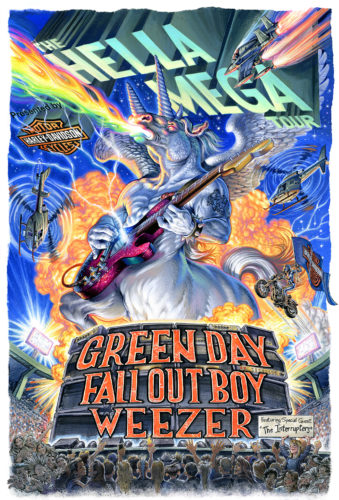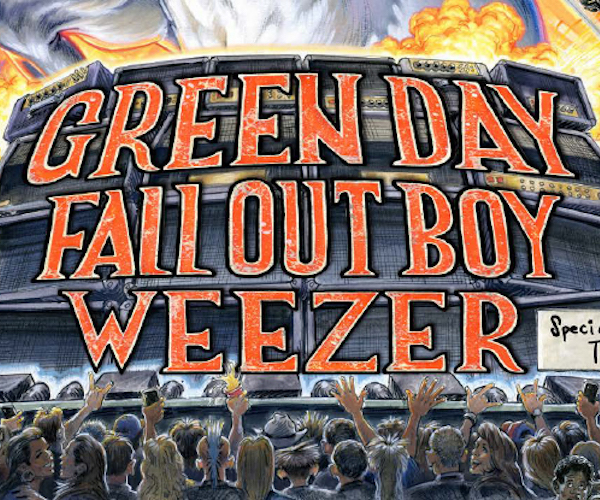Music Commentary: Modern Marketing and The Hella Mega Tour
By Deanna Costa
If the music industry put as much effort into being fair to their customers as they put into taking their money, everyone could participate in the rocking world.
 Last Tuesday, the marketing geniuses at Crush Music unlocked the password-protected HellaMegaTour.com, along with Green Day, Fall Out Boy, and Weezer’s informational websites. The rumors over the weekend proved to be true: the Holy Trinity of Pop-Punk is going on a shared tour in 2020.
Last Tuesday, the marketing geniuses at Crush Music unlocked the password-protected HellaMegaTour.com, along with Green Day, Fall Out Boy, and Weezer’s informational websites. The rumors over the weekend proved to be true: the Holy Trinity of Pop-Punk is going on a shared tour in 2020.
All four websites announced the details of each band’s new album release dates, shared tour dates, and how to obtain coveted ticket presale codes. The presale is where their slickest marketing maneuver comes in. Crush successfully united three bands with millions of fans, who all know how quickly the shows will be sold out. The team exploited the financial opportunity in fans’ desperation by finding a way to simultaneously encourage ticket, apparel, and album sales all in one twist.
When one preordered an item from any of the bands’ online stores that day, the confirmation email included a code that unlocked ticket sites four days before the general sale date, Friday, September 20. By combining purchases with presale access, they guaranteed immediate sellout of merch packages and the new albums as well.
The Crush marketers also created a Hella Mega Tour Instagram, Twitter, Facebook page, and Facebook group. Groupies of all ages and nationalities are using them to share their excitement and to ask about logistics of the tour. Many people are also discussing how they will have to travel for hours to get to the closest show. More still have enthusiastically opened up about their personal histories with their favorite band of the three, prompting endless followers to contribute their own stories.
Of course, all the revelry took me back to my own relationships with the groups. I was sitting cross-legged on the living room floor, coloring in wide sweeps, when I first heard Green Day. I can’t remember the exact year, but I wasn’t school age yet. Billie Joe was aggressively strumming away while singing “Basket Case” in a colorized asylum on MTV. The bright background attracted my young mind and, in one glance, I was entranced. Like so many before (and after) me, I had found my first love.
The band continued to weave in and out of my life, as they rose to stardom and I rose to adolescence. Somewhere along the way, I also picked up a couple of albums by Weezer, who were inspired by my favorite trio even more than I was. By middle school, I finally discovered Fall Out Boy and could instantly relate to their lovesick hits.
My best friend in eighth grade was (and still is) a Pete Wentz-aholic. We plastered our bedroom walls with posters of our favorite rock stars, but Pete and Billie Joe always remained at the top of our respective lists. We layered and dyed our hair, donned our skinny jeans and Chuck Taylors. We daydreamed for hours on end, hoping we’d be lucky enough to see both groups live. Growing up with little means, we oftentimes worried that the sacred day would never come.
Our memories of those angst-filled days are hardly unique. A quick look at social media shows that we unknowingly shared these moments with countless music lovers across the world. Fellow punk and emo kids worshiped Green Day, FOB, and Weezer just as much as we did. Followers that were the same age as the musicians spent their 20s and 30s rocking out at the very shows we pined for.
Despite all of the collective fantasies dreamed around the globe over the years, I daresay no one could have expected the reality that is coming in 2020. Within hours, droves of fans sold out North American shows when presale tickets were released on Monday, the 16th. The next day, European sales went live, and sold out just as rapidly.
The bands’ frontmen explained the birth of the concept in a triple-interview that Billboard published the day after the tour was announced. Green Day wanted to do a stadium run similar to Monsters of Rock (the ’80s tours featuring the likes of Van Halen, Metallica, and Scorpions). The other two groups were already on the Crush management roster, so they pitched the idea via email to Rivers Cuomo, Pete Wentz, and their respective bandmates. Everyone was instantly on board.
The Hella Mega Tour isn’t an original idea, but marketing teams have been constantly reinventing fan engagement to keep up with the growth of social media. Planting leaks over the weekend before the announcement, encouraging Redditors and Twitterites to obsess over cracking the websites’ passwords, creating online communities for fans to hype each other up in, sharing photos and interviews of the heartthrob frontmen on those pages — these are the new, free advertising ploys that are at the top of the musician promotion playbook.

These standard practices were unimaginable in the early years of rock. Publicity stunts from way back when would most likely come across as corny today. Yet, though I am very much the tour’s target demographic, I can’t help but find this 21st-century sales charade quickly becoming just as stale. I can admit that I took the bait and bought some merch myself, but it does feel unfair that fans with more spending power are getting early access to the tickets.
Pricing for the Fenway performance starts at $79.50 for nosebleeds, capping at $219.50 for general admission to the turf zones in front of the stage. Nearly everyone in the Hella Mega Tour Facebook Group has been pleasantly surprised by the reasonable prices, though several expressed frustration with site lags and crashes that sent them to the back of the queue.
Ticketmaster and individual venues claim that they reserve a fair mix of seating for each round of purchases, but this balancing act doesn’t go far enough to make the world of online ticket sales equitable. Promoters also tried (and failed) to curb scalpers by limiting transactions to a maximum of four tickets each. Despite this restriction, tickets were immediately found on sites that inflate prices (such as Stub Hub) anyway.
Leveling the playing field for deserving modern concert-goers offers many challenges. Some variables are out of management’s control; yet, I can’t help but think that much more can be done. If the music industry put as much effort into being fair to their customers as they put into taking their money, everyone could participate in the rocking world.
Deanna Costa is a recent graduate of Boston University’s College of Communication, where she earned a B.S. in Journalism with a focus on Magazine Design. During her time at BU, she covered local concerts for on-campus publications in multiple formats. Outside of writing, she routinely interviewed artists and reviewed albums live on her weekly radio show, DJ-ed on campus events, and held the Studio Productions Director position in 2017. Currently, she is a full-time administrative assistant, a freelance music journalist, and host of the Arts Fuse Podcast: The Short Fuse.
Tagged: Deanna Costa, Fall Out Boy, Green Day, Hella Mega Tour
